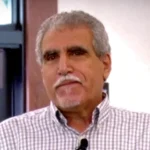Estimated reading time: 7 minutes
I first met Steve and his wife, Pat, at a group breakfast that was hosted at church. They had asked if we had a wheelchair available because Steve was recovering from a post-surgical infection after being diagnosed with cancer and felt a little unsteady.
Steve explained that this had been his second surgery for an aggressive form of brain cancer but that he was doing well—and was very confident that he was now cancer-free. I told him about our faith-based support group at a local cancer center and that it was also open to families and loved ones.
Later that afternoon, Steve called me and confessed that everything was not OK and that he was struggling both emotionally and spiritually. Before his first surgery, he hadn’t given much thought to spiritual matters, and he didn’t have any real faith tradition. But Pat was a Christian and had been urging him to attend church for some time, especially after being diagnosed with cancer.
Finding fellowship after being diagnosed with cancer
After our conversation, Steve started checking out local churches in hopes of finding something that might “work” for him. He even asked Pat to attend a synagogue with him once. That was all before he found a kind of spiritual connection at a church that they began attending. Although Steve had settled into a community of believers, he had not yet given his life to Christ. He simply reasoned that he needed the hope that Christ could offer him.
Steve and Pat joined the cancer support group I had originally told them about. After several weeks of meeting together, a pastor suffering from metastatic pancreatic cancer sensed Steve’s new openness to a real and saving faith. The pastor asked if Steve would like to give his life to the Lord—and Steve did so. One month later, surrounded by everyone in our support group and most of their families, he was baptized.
Although Pat was grateful for Steve’s group participation and his baptism, she still wasn’t sure if Steve had indeed given his life to the Lord. Because they were close as a couple and Pat knew that Steve always did things methodically, she wondered if he had just been “checking off the boxes” in case he relapsed—or maybe even just to please her.
About four months later, Steve received the results of a new MRI. It was bad news. He acted like everything was OK and was almost dismissive of what the doctor had said regarding his condition. Pat was worried; she thought Steve was in denial.
Growing in faith after being diagnosed with cancer
A few days later, Steve and I met for breakfast. I asked him how he felt about the test results. Steve told me that he really didn’t feel anything and that it surprised him. He wasn’t sad or upset but wasn’t happy about it either. He went on to explain that although he didn’t really feel anything, what he was experiencing felt different than numbness.
Steve informed me that he had been praying the whole week before his MRI that he would be able to “just give it all to God, no matter what the results were.” Then he sat up a little and, as if he were finally convinced, said that he really thought he had been able to give it to God. He seemed to have a genuine peace.
Groundhog day
Steve further explained how the days after the test results felt a little like the movie Groundhog Day: Every day that the character Phil (Bill Murray) wakes up, it’s the same day all over again. Each day Steve woke up after receiving his “not good” news, the first thing he would think of was the MRI and what the doctor had told him. But right after those thoughts, he was able to give it to God again. Immediately, he would experience peace. What a wonderful gift he had received—he was able to experience a genuine peace in accepting the bad as well as the good. I knew that his wife no longer needed to wonder if Steve had simply been “checking off the boxes.” It was obvious that he had been changed.
Steve declined noticeably in the next couple of months, never giving up hope for a physical cure but at peace with whatever was before him. And his relationship with Pat during that time? They grew even closer to each other because they were truly able to come together emotionally and spiritually. Steve’s struggle with cancer had ultimately brought him closer to his wife and to the Lord.
I saw Steve a couple of days before he passed away—on one of the last days, he could communicate vocally. Before I left, he took my hand and, with a smile, said, “It’s still Groundhog Day.”
After being diagnosed with cancer slow down and spend time with family
Shannon and Darren’s twins—a boy and a girl—were 9 years old when Shannon was diagnosed with breast cancer. Shannon worked in HR management, and Darren was an assistant athletic director at a university. The couple was extremely busy and often didn’t make time to take vacations, let alone eat together as a family. The diagnosis devastated Shannon and Darren, but Darren rallied, making it clear to Shannon that he would support her and do his best to support her during breast cancer treatment.
Slowing down
Even as the couple became more intentional about being strong for each other, the treatment phase slowed down the couple’s life and changed their priorities as well. Now closer than ever as a couple, Shannon and Darren began placing more value on the quantity and quality of their time spent together as a family.
After Shannon’s initial surgery and treatment, the doctors gave the family good news: Shannon’s cancer had gone into remission. Feeling healthy again, Shannon wanted to be with the twins while they experienced certain joys for the first time, such as skiing and snowmobiling. When Shannon and Darren found out that the cancer had returned, their zest for life increased, deciding that the family should be together as much as possible.
Shannon chose to do one thing without her family, however. She joined a faith-based cancer support group. Darren offered to go to the group with her, but she told him she knew she had his total support already. The time she spent with the group felt sacred. She said the group helped her perspective shift away from anger and disappointment and toward peace.
Darren, desiring to show his love and commitment to her, asked Shannon if they could renew their wedding vows. Shannon agreed, wanting the kids to see how much love they had for one another. The whole family took a 20-mile limousine ride to Emerald Bay in California’s Lake Tahoe and experienced a beautiful ceremony.
Deciding how to proceed
Shannon’s next concern was how to proceed with treatment. One day, during the car ride to an appointment with her oncologist, Shannon told Darren that she had been praying for a clear sign of whether to keep fighting and be sick or if God had something else for her. Darren and Shannon already had a feeling that the cancer was spreading faster than it could be treated. The oncologist could have been clinical during the appointment, but he chose a more supportive role, which answered Shannon’s prayer for clarity. He gently said it was time to “hug each other and the kids.” So Shannon and Darren changed the plan from fighting the cancer to making Shannon comfortable.
Darren has good advice for all of us: “Please take time [to spend] with your families. Stop sometimes and appreciate one another more than you do already. Set aside some time together for no other reason than to just be together.”
If you’re experiencing a family crisis, Focus on the Family has resources and counseling to assist. You can contact us Monday through Friday from 6 a.m. to 8 p.m. (Mountain time) at 855-771-HELP (4357) or help@FocusOnTheFamily.com
















